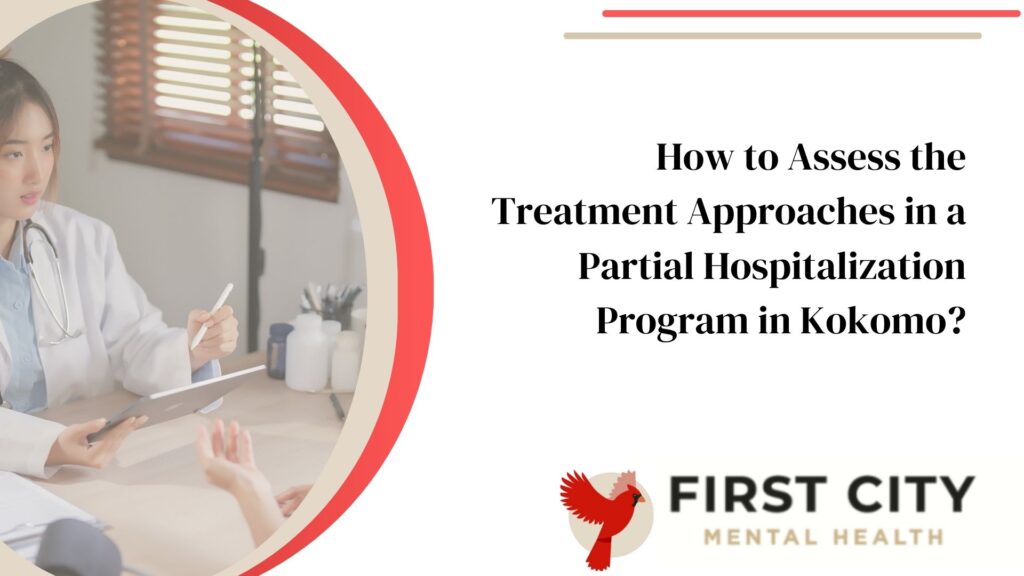
How are Partial Hospitalization Programs Cost-Effective and Accessible?
January 25, 2025
What Role Do Partial Hospitalization Programs Play in Relapse Prevention?
January 27, 2025Choosing the right partial hospitalization program (PHP) in Kokomo can be a challenge, especially if you’re dealing with mental health concerns. Mental health treatment programs vary significantly in their services and quality.
This article will guide you through essential factors to consider when selecting the best PHP for your needs. Keep reading to make an informed decision that supports your journey to better mental health.
Key Takeaways
- Check Accreditation: Ensure the program is accredited by recognized institutions such as The Joint Commission or CARF. This guarantees adherence to high standards and quality care.
- Evaluate Staff Qualifications: Look for programs with experienced mental health professionals, including qualified therapists and psychiatrists. The professional staff ensures comprehensive and effective treatment.
- Personalized Treatment Plans: Opt for programs that offer personalized treatment plans tailored to individual needs rather than a one-size-fits-all approach. Custom plans enhance recovery outcomes.
What to Look for in a Partial Hospitalization Program in Kokomo?
Selecting the right Partial Hospitalization Program Kokomo involves several factors. Consider these key elements to make an informed decision:
- Accreditation: Ensure the program is accredited by recognized institutions. Accreditation signifies adherence to high standards.
- Qualified Staff: Look for a program with experienced mental health professionals, including therapists and psychiatrists, who can provide comprehensive care.
- Comprehensive Services: Find out if the program offers a range of services, such as individual therapy, group therapy, medication management, and family counseling.
- 24/7 Supervision: Verify if the facility provides round-the-clock supervision and care, which is crucial for safety and support.
- Multidisciplinary Approach: Check whether the treatment team includes specialists such as psychologists, social workers, and nurses to address all aspects of mental health.
- Treatment Approaches: Evaluate whether the program uses evidence-based methods, such as dialectical behavioral therapy (DBT), for effective treatment outcomes.
- Location: Proximity to home can be important for ease of access. A closer location reduces travel stress and keeps you connected with your support network.
- Personalized Treatment Plans: Ensure that treatment plans are tailored to meet individual needs rather than a one-size-fits-all approach.
- Aftercare Planning: Look for programs that offer aftercare planning and resources to support patients once they transition back home.
- Cost and Insurance Coverage: Confirm what costs will be covered by insurance companies such as Medicare or other providers. Verify any out-of-pocket expenses you may incur.
Why Accreditation Matters When Choosing a Partial Hospitalization Program in Kokomo?

Moving from identifying key features to focusing on accreditation, its importance cannot be overstated. Accreditation from organizations like the Joint Commission or CARF ensures that partial hospitalization programs adhere to industry standards and best practices.
These stamps of approval guarantee compliance with safety guidelines, effective treatment protocols, and highly qualified staff.
Choosing an accredited facility like First City Mental Health Center provides peace of mind. Accredited centers meet rigorous standards in offering exceptional clinical programs and mental health care services like mental health partial hospitalization program.
How to Evaluate the Quality of a Partial Hospitalization Program in Kokomo?
Choosing the right partial hospitalization program mental health in Kokomo requires careful evaluation of several key factors. Assessing the quality ensures that adult patients receive effective and compassionate care.
- Evidence-Based Therapies
Look for programs that use evidence-based therapies like Cognitive Behavioral Therapy (CBT) and Dialectical Behavior Therapy (DBT). These approaches have been proven to help manage mental health symptoms effectively. - Multidisciplinary Assessment
Ensure the program provides a comprehensive assessment by a multidisciplinary team, including psychiatrists, therapists, and other health services providers. This team can identify the specific needs of adult patients. - Structured Daily Routines
The program should offer structured daily routines filled with therapeutic interventions. Consistent schedules help stabilize daily functioning and establish a sense of normalcy. - Holistic Approaches
Check if the program includes holistic approaches like art therapy and yoga. Such activities help address both mental and physical health aspects. - Treatment Goals
Evaluate if the program sets clear treatment goals tailored to each patient’s needs. Personalized goals are crucial for tracking progress and adjusting treatments as needed. - Facilities and Environment
Inspect the facilities to ensure they are clean, safe, and conducive to healing. A calm environment is vital for recovery from behavioral health issues. - Program Schedule Flexibility
Make sure the program schedule allows flexibility to attend school or work during the day while participating in intensive treatment sessions. - Insurance Coverage
Investigate whether the program accepts your insurance company to minimize out-of-pocket costs. Knowing what expenses will be covered by insurance is essential. - Continuity of Care
Assess how well the treatment center ensures continuity of care after completing the partial hospitalization services. Continuous support helps maintain progress made during intensive treatment.
Next, investigate why location is critical when selecting a partial hospitalization program.
How to Assess the Treatment Approaches in a Partial Hospitalization Program in Kokomo?

Evaluating treatment approaches in a partial hospitalization program PHP involves several critical steps. This guide will help you determine if a program meets your needs.
- Identify Core Therapies
Ask about the main types of therapies, such as Cognitive-behavioral therapy (CBT), dialectical behavior therapy (DBT), and psychodynamic therapy. These therapies are essential for effectively treating various mental health conditions. - Check for Dual-Diagnosis Treatment
Ensure the program offers dual-diagnosis treatment if dealing with both mental health and substance abuse issues. Integrated care is crucial for comprehensive recovery. - Explore Family Involvement
Find out if the program includes family therapy options. Family support can significantly contribute to the success of treatment. - Look at Holistic Options
Investigate whether alternative treatments like yoga, meditation, or equine-assisted psychotherapy are available. These holistic therapies can complement traditional methods and enhance overall well-being. - Ask About Creative Therapies
Determine if art, music, or occupational therapy is part of the treatment plan. These creative therapies offer varied ways to express emotions and cope with challenges. - Confirm Flexibility in Treatment Plans
Inquire about personalized treatment plans tailored to individual needs rather than one-size-fits-all solutions. Personalized plans adapt to each patient’s unique circumstances and progress. - Evaluate Staff Qualifications
Assess the credentials of therapists and psychiatrists involved in the program. Qualified professionals ensure high-quality care and effective treatment outcomes. - Observe Group Settings vs Individual Therapy Balance
Check how the program balances group sessions with individual therapy sessions to cater to different therapeutic needs effectively. - Review Success Rates and Feedback
Look into patient outcomes and read reviews or testimonials from former participants to gauge the program’s effectiveness and reputation. - Inquire About Follow-Up Care
Ask how continuity of care is ensured after completing the PHP, including any outpatient services or support groups they may offer.
Why Location Is Important in Selecting a Partial Hospitalization Program?
Choosing an Indiana Partial Hospitalization Program (PHP) in Kokomo requires careful consideration of the program’s location. Proximity to home is crucial for easier family involvement, which bolsters support and enhances recovery outcomes.
Access to local support systems post-treatment plays a significant role in maintaining progress and avoiding relapse.
Additionally, the availability of recreational activities like sports and outings contributes significantly to creating a comfortable and stress-free environment for participants. These activities are vital as they provide a healthy outlet for stress relief and facilitate social interactions, improving overall mental health during treatment.
What Questions to Ask When Choosing a Partial Hospitalization Program in Kokomo?
Choosing the right partial hospitalization program (PHP) in Kokomo is crucial for effective treatment. Asking the right questions can help you gather vital information and make an informed decision.
- What are the program components and therapies offered?
- Ask about the specific therapies in the program, such as cognitive-behavioral or group therapy. Understanding the therapeutic approaches helps gauge if they align with your needs.
- What is the length of stay and typical daily routine?
- Inquire about how long participants usually stay in the program and what a typical day looks like. This information helps set expectations about daily schedules and overall time commitment.
- How does the facility handle aftercare planning?
- Once you complete the program, find out their strategy for aftercare. Knowing their approach ensures continuity of care and supports your recovery process.
- What credentials and accreditations does the facility have?
- Verify if they hold necessary accreditations from recognized bodies like The Joint Commission or CARF International. Accreditations signify compliance with high standards of care.
- Who are the primary caregivers involved in treatment?
- Ask about staff qualifications, including whether a program psychiatrist oversees treatments. Knowing who will be part of your care team builds trust in their expertise.
- What are the out-of-pocket costs associated with the program?
- Understanding financial responsibilities is essential. Clarify all potential expenses to plan accordingly, especially if insurance does not cover everything.
- How do they tailor treatment plans to individual needs?
- Discover how they personalize treatment plans based on individual assessments. By addressing specific issues, personalized plans increase the chances of successful outcomes.
- Is family involvement encouraged during treatment?
- Explore whether family members can participate in therapy sessions or support meetings. Family involvement often strengthens support systems and improves recovery success rates.
- What measures are taken to ensure patient safety?
- Assess policies on maintaining a safe environment for patients, especially those requiring more intensive treatment, but staying overnight isn’t necessary.
- How accessible is the location for regular visits?
- Consider whether proximity allows for consistent participation without undue stress from travel logistics, vital for sustained engagement in outpatient settings like PHPs.
Why Personalized Treatment Plans Are Essential in Partial Hospitalization Programs?
Personalized treatment plans in adult partial hospitalization programs are crucial because they address each patient’s unique needs. We at First City Mental Health Center, for example, ensure that upon arrival, every individual receives an individualized treatment plan tailored to their specific conditions, such as depression, anxiety, bipolar disorder, and PTSD.
This customized approach significantly enhances long-term recovery by focusing on particular challenges rather than a one-size-fits-all method.
Patients benefit from having treatments designed specifically for them. This includes therapies targeting their symptoms and support systems aligning with their personal goals.
An adult partial hospitalization program can provide comprehensive care without needing overnight stays or inpatient care while offering intensive support comparable to traditional hospitalization.
This flexibility allows patients to maintain daily routines and responsibilities while receiving necessary treatment geared toward sustainable recovery.
How to Ensure Continuity of Care After a Partial Hospitalization Program?

Transitioning out of a partial hospitalization program in Indiana requires careful discharge planning to address ongoing mental health needs. Aftercare services like support groups and outpatient programs can provide essential support during this period.
Effective discharge planning should include medication management to ensure there are no interruptions in the prescribed treatment regimen.
Family support and peer support programs play vital roles in maintaining stability after leaving a PHP. These resources help create a safety net, promoting smoother transitions into aftercare services.
Regular contact with an outpatient provider also helps individuals maintain their progress without requiring inpatient hospitalization again.
Conclusion
Choosing the right partial hospitalization program in Kokomo requires careful consideration of several factors. Ensure the program is accredited to guarantee quality care and professional standards.
Evaluate treatment approaches to find what best suits your needs. Confirm that the location is convenient for you or your loved one. These steps will help you decide on effective mental health support.
FAQ’s
1. What is a Partial Hospitalization Program (PHP)?
A PHP is a structured mental health treatment program providing intensive daytime therapy while allowing patients to return home at night.
2. What should I look for in a PHP in Kokomo?
Look for accreditation, qualified staff, therapies, personalized treatment plans, and positive reviews.
3. How do I know if PHP is right for me?
PHPs are ideal for those needing intensive treatment without 24-hour supervision, often after inpatient care. Consult a healthcare professional for guidance.
4. What types of therapies are offered in a PHP?
PHPs typically offer individual, group, and family therapy, medication management, and various specialized therapies like CBT and DBT.
5. How can I verify the quality of a PHP in Kokomo?
Check for accreditation and research success rates, read reviews, and seek recommendations from healthcare providers or support groups.






